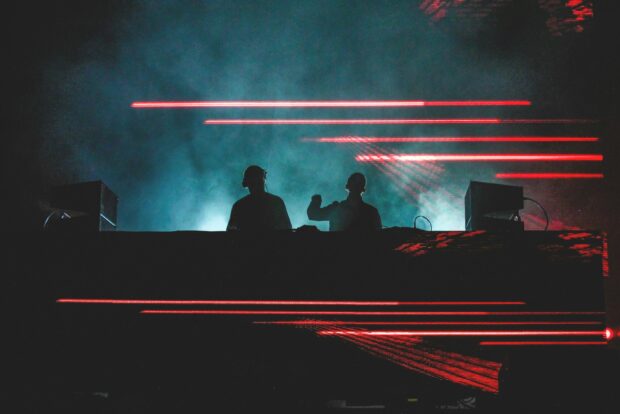You have no items in your cart. Want to get some nice things?
Go shopping
She didn’t know what it was but she just had this thing for DJs: they were like gods up there on the Technics turntables, laying down the vinyl law from on high, even though of course DJs were obviously only human, sometimes all too human—she’d been around enough DJs that she knew a thing or two about some of the ugly stuff that went on, but that wasn’t due to anything other than the fact that DJs, just like everyone else, were people, and if you expected them to be anything else, you were crazy, but nevertheless, she’d see them up there, with those cool lasers shining out of their eyes and lighting up the labels of these awesome records no one had ever heard of or even imagined existed, and she’d just fall for them, these DJs, more often than not, although it helped that she was always dancing and having a great time with her friends when she saw them, the DJs, it being kind of natural that she’d find people more attractive when she herself was feeling most attractive and having an amazing time with the people she liked to party with best, and so—because the DJs were always the ones who were sort of orchestrating her good times—it made sense that she came to see them functioning in a kind of suprahuman capacity, delivering, not just the transcendence of the music itself, but the much more specific and eroticizing transcendence of music that was particularly brilliant within the general architectonic of the (often arbitrarily overcodified) systems of categories and genres and subgenres—all of which were characterized by specific formal features—that constituted the totality of which the DJ was a hierophant in the first place, and of which good or great DJs then proceeded to demonstrate their complete mastery, leaping beyond themselves and yet miraculously remaining themselves, which maybe had something to do with the fact that a lot of DJs had contradictory or conflicted or conflated personalities, but anyway it all made a lot of sense in a kind of prosaic way, now that she thought about it and realized that what she was actually talking about was less her tendency to like DJs than the logic of why she would like them, within a given matrix of social possibility and the ambient conditions that generally prevailed when she met them—but all of this wasn’t to say that she only went for DJs, because she wasn’t one of these people who attached their sense of self-worth to a DJ simply because a DJ was an object of adulation or veneration who, by a sort of refracted veneration or adulation, would endow her with a concomitant value in the eyes of the other revelers—no, thank God she was not one of those people or those types of people, and in fact, that was one of the reasons why she was saying this in the first place.
About Mark Crimmins
Mark Crimmins grew up in Manchester and emigrated to the United States in 1978. He studied English Literature at the University of Toronto, where he received his MA and PhD in literature. He taught contemporary fiction and literary theory at the University of Toronto for seventeen years. His first book, travel memoir Sydneyside Reflections, was published in 2020 and has been praised for its prose style. His flash fictions have been published in numerous literary magazines in the United States and have also been published in Australia, New Zealand, Chile, Japan, Canada, and the UK. He is currently an associate professor of English studies at the Chinese University of Hong Kong, Shenzhen, in China.
- Web |
- More Posts(1)




